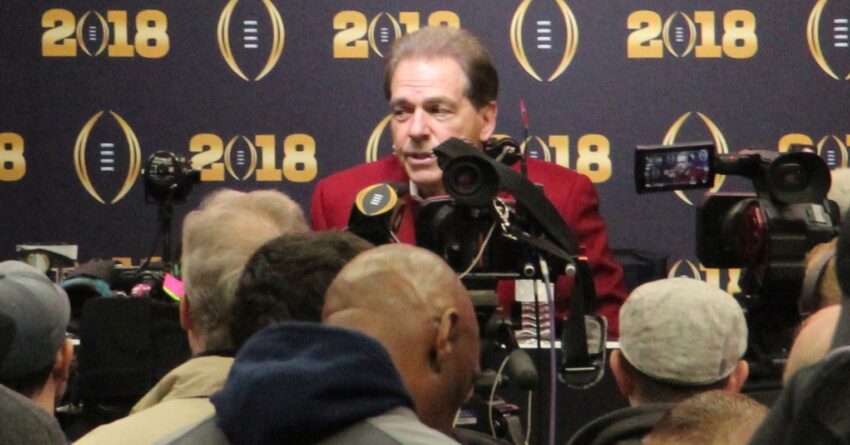
English writer William Shakespear
Source: Photo of painting attribute to John Taylor, courtesy of Wiki Commons
“Expectation is the root of all heartache,” said William Shakespeare.
Though it’s doubtful that the British literary icon had sports in mind when he made that observation, it certainly applies to athletic and other performance endeavors.
Buddhist philosophy agrees. One of the Four Noble Truths of Buddhism maintains that unfulfilled expectations cause suffering.
To rephrase from a sports perspective, expectation is the mother of distraction, frustration, poor performance, and ultimate heartache. Whether the expectation is positive or negative, it gets in the way and doesn’t work.
How so? Let’s explore.
Over-Focusing on Outcomes
Success in athletics, and any other endeavor, is achieved by executing the skills and actions necessary for optimal performance. That requires focus on process, not on the outcome (expectations). A series of quotes by Alabama head football coach Nick Saban illustrates the point.

Alabama Crimson Tide football coach Nick Saban conducting a 2018 press conference
Source: Photo by Thomson200, public domain, courtesy of Wiki Commons
“A good process produces good results,” Saban said. “You want to focus on the process of what it takes to be successful. Success doesn’t come from pie-in-the-sky thinking (desired outcome—expectations). It’s the result of consciously doing something each day that will add to your overall excellence.”
That approach may explain Saban’s 201-28 won-loss record at Alabama and his seven National collegiate championships with the Crimson Tide. Take note Ohio State, Michigan, and other college football wannabes.
A strict focus on outcome—what you want to happen—is like wishing for desired results; the ‘pie-in-the-sky thinking’ mentioned by Saban. Might it be more productive to focus on the ‘process’—doing the skills necessary for the task at hand?
A Bad Penny
Expectation is like a coin. Heads, the presumptions of easy victory against weak competition. Tails, the projection of hopelessness against quality opponents. The first expectation resulting in overconfidence and lackadaisical performance. The second outlook leading to pressured, fearful, and inhibited effort.
Both of those approaches will result in failed execution and performance.
Many athletes look at the won-loss record of their opposition and jump to one of those coin sides in their pre-competition thoughts, talk, and social media banter.
Heads you lose, tails you lose.
How about tossing that bad penny away and just focusing on executing the skills and actions required to compete—the process?
Perfectionistic Unrealism
A swing and a miss in baseball, a missed basketball shot, or a dropped football pass are inevitable occurrences of the sports experience. Watch a youth sporting event when such imperfect things occur and you’re sure to witness kids acting as if the sky was falling in when those things occur. Head hanging, tantrums, moping on the bench, crying, equipment throwing, complaining, blaming etc., are evident.
Such reactions undermine subsequent performance due to the thoughts and emotions that carry over into the next play(s). The game moves on, but athletes experiencing such emotional hangovers do not.
Preceding thoughts and fears of not living up to desired outcomes can also disrupt performance. Perfectionistic self-expectations add pressure and anxiety, thus disrupting performance due to the weight of that self-imposed stress.
Expectations for making the team, playing time, coach-assigned position, and other routine aspects of the sports experience will result in similar frustrations and reactions when things don’t play out the way the athlete desires.
They haven’t figured out that there are things in sport they do not control—just like in other life endeavors—and that they are not always going to get what they want, or anything else in life.
Sport and Competition Essential Reads
Control the controllable and let go of the rest.
Unrealistic, perfectionistic expectations lead to long-term destructive pressure, misery, and eventual burnout. Many young people quit a once beloved sport to evade the resulting stress and suffering. A case of what contextual behavioral science calls “experiential avoidance,” a psychological term for actions that seek relief from pain.
Many young athletes have unrealistic career expectations of getting a college athletic scholarship or have a professional sports future. No room, here, to fully address the devastating frustration and suffering experienced when that doesn’t happen.
Those desires are so far off the reality charts as to be fairy tale stuff. Only six percent of high school athletes go on to play in college. Chances for a professional career are microscopic. It’s one thing for a 9- or 10-year-old to think that way, but a teenager or young adult? They’re like a three-year-old believing they’re a princess.
Somebody—especially moms and dads—needs to clue them in.
Parental Expectations
Modern-day sports parents can get caught in the same trap as their athletic offspring.
Frustration and anger when their kids are not in the starting lineup, do not get desired playing time, or make a mistake in competition. This can lead to unnecessary parental pain and bad sideline behavior. Such immature antics are bad role playing and produce undue pressure and embarrassment for their children.
Parents pour lots of money into their children’s athletic career, paying for expensive equipment, instruction, and youth sports programming. They have also spent enumerable hours driving to and from athletic activities, watching practices and competitions, and attending countless meetings.
That steep investment can create unrealistic expectations for ultimate outcomes, such as college athletic scholarships and potential professional careers, partially fueled by youth sports personnel who spin such pie-in-the-sky expectations as a marketing ploy to lure naïve families into their sport’s organizational web of money-hungry deceit.
When such expectations do not materialize, parents can be as surprised, disappointed, and as devastated as their kids. You would hope that adults would know better and provide guidance for their young athletes to allow them to successfully navigate through those muddied expectational waters to the safe shores of reality.
Sadly, they often do not, getting lost in those same polluted seas.
Spectators
Even sports fans can get trapped in the expectation heartache crucible. Take hapless Cleveland Browns’ football fans as a prime example.
Every year those poor Cleveland sports enthusiasts get caught up in team public relations and media hype, including predictions for a first-ever Browns’ trip to the Super Bowl, only to have their hopes crash in despair.
Could this be the year for a Browns’ Super Bowl appearance? Sure. But Cleveland has one NFL championship (1964) to its credit in the last 68 years.
A Sport Psychology Antidote
Take it from the unlikely trio of William Shakespeare, Buddha, and Nick Saban. Expectations can lead us down a path of frustration, suffering, and failure.
Whether your expectations are pie-in-the-sky positive, down-in-the-dumps negative, or perfectionistic, what’s the point? Those are all meaningless lines of thinking and emotion that have nothing to do with playing the game and are major obstacles to optimal performance.
Instead, focus on the process of improving and executing the skills necessary for successful competitive performance.
Leave your predictions, desired outcome of your performance, pie-in-the-sky hopes, perfectionism, and other expectation outside the sports realm, and put your attention on what you actually control—your actions, focus, and effort.
Doing that will reduce pressure, frustration, and misery. It will also enhance your ability to execute the skills necessary for your sporting activity.
How about forgetting the hype, the predictions, and the expectations?
Just sit back, enjoy, and let the games and season play out. If their team makes it to the Super Bowl, wonderful! Otherwise, it will be manageable disappointment minus the painful frustration and suffering Cleveland fans have endured through seemingly endless fruitless years.
